Learn about our comprehensive antibody validation methods to ensure monospecificity. Antibody Validation>>
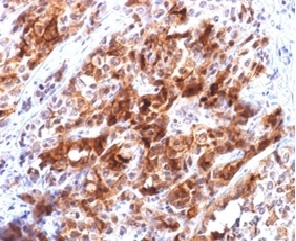
Formalin-fixed, paraffin-embedded human hepatocellular carcinoma stained with Glypican-3 Mouse Recombinant Monoclonal Antibody (rGPC3/863).
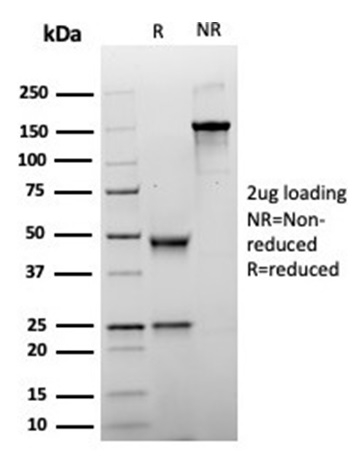
SDS-PAGE Analysis Purified Glypican-3 Mouse Recombinant Monoclonal Antibody (rGPC3/863). Confirmation of Integrity and Purity of Antibody.
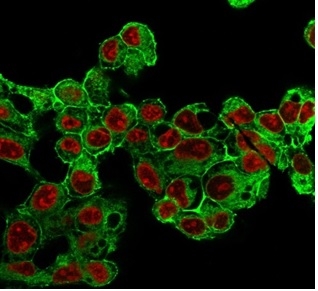
Immunofluorescence Analysis of MeOH-fixed HepG2 cells labeling GPC3. Glypican-3 Recombinant Mouse Monoclonal Antibody (rGPC3/863) followed by goat anti-mouse IgG-CF488 (green). Counterstain is RedDot (red).
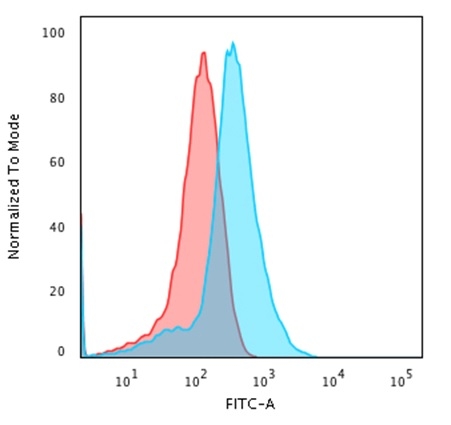
Flow Cytometric Analysis of MeOH-fixed HepG2 cells. Glypican-3 Recombinant Mouse Monoclonal Antibody (rGPC3/863) followed by goat anti-mouse IgG-CF488 (blue); isotype control (red).
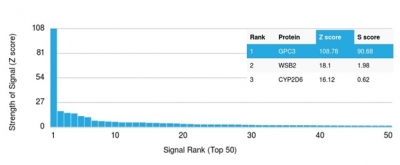
Analysis of Protein Array containing more than 19,000 full-length human proteins using Glypican-3 Recombinant Mouse Monoclonal Antibody (rGPC3/863). Z- and S- Score: The Z-score represents the strength of a signal that a monoclonal antibody (MAb) (in combination with a fluorescently-tagged anti-IgG secondary antibody) produces when binding to a particular protein on the HuProtTM array. Z-scores are described in units of standard deviations (SD's) above the mean value of all signals generated on that array. If targets on HuProtTM are arranged in descending order of the Z-score, the S-score is the difference (also in units of SD's) between the Z-score. S-score therefore represents the relative target specificity of a MAb to its intended target. A MAb is considered to specific to its intended target, if the MAb has an S-score of at least 2.5. For example, if a MAb binds to protein X with a Z-score of 43 and to protein Y with a Z-score of 14, then the S-score for the binding of that MAb to protein X is equal to 29.
Glypican-3 (GPC3) is a glycosylphospatidyl inositol-anchored membrane protein, which may also be found in a secreted form. Anti-GPC3 has been identified as a useful tumor marker for the diagnosis of hepatocellular carcinoma (HCC), hepatoblastoma, melanoma, testicular germ cell tumors, and Wilm s tumor. In patients with HCC, GPC3 is overexpressed in neoplastic liver tissue and elevated in serum, but is undetectable in normal liver, benign liver, and the serum of healthy donors. GPC3 expression is also found to be higher in HCC liver tissue than in cirrhotic liver or liver with focal lesions such as dysplastic nodules and areas of hepatic adenoma (HA) with malignant transformation. In the context of testicular germ cell tumors, GPC3 expression is up regulated in certain histologic subtypes, specifically yolk sac tumors and choriocarcinoma. A high level of GPC3 expression is also found in some types of embryonal tumors, such as Wilm s tumor and hepatoblastoma, with a low or undetectable expression in normal adjacent tissue. In patients with thyroid cancer, expression of GPC3 is dramatically enhanced in certain types of cancers: 100% in follicular carcinoma and 70% in papillary carcinoma. Expression of GPC3 in follicular carcinoma is significantly higher than that of follicular adenoma. In contrast, GPC3 is not expressed in anaplastic carcinoma.
There are no reviews yet.